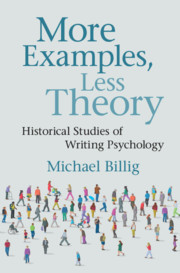Description
More Examples, Less Theory
Historical Studies of Writing Psychology
Author: Billig Michael
By examining key psychologists from the past, this book shows why examples are so important and theory is over-valued.
Language: English
Subject for More Examples, Less Theory:
Approximative price 120.27 €
In Print (Delivery period: 14 days).
Add to cart
More Examples, Less Theory
Publication date: 10-2019
292 p. · 15.7x23.5 cm · Hardback
Publication date: 10-2019
292 p. · 15.7x23.5 cm · Hardback
Approximative price 32.87 €
In Print (Delivery period: 14 days).
Add to cart
More Examples, Less Theory
Publication date: 10-2019
292 p. · 15.2x22.8 cm · Paperback
Publication date: 10-2019
292 p. · 15.2x22.8 cm · Paperback
Description
/li>Contents
/li>Biography
/li>
In his new book, Michael Billig uses psychology's past to argue that nowadays, when we write about the mind, we should use more examples and less theory. He provides a series of historical studies, analysing how key psychological writers used examples. Billig offers new insights about famous analysts of the mind, such as Locke, James, Freud, Tajfel and Lewin. He also champions unfairly forgotten figures, like the Earl of Shaftesbury and the eccentric Abraham Tucker. There is a cautionary chapter on Lacan, warning what can happen when examples are ignored. Marie Jahoda is praised as the ultimate example: a psychologist from the twentieth century with a social and rhetorical imagination fit for the twenty-first. More Examples, Less Theory is an easy-to-read book that will inform and entertain academics and their students. It will particularly appeal to those who enjoy the details of examples rather than the simplifications of big theory.
1. Introduction; 2. Locke and Shaftesbury: foster father and foster son; 3. Tucker and James: in the same stream of thought; 4. Freud: writing to reveal and conceal himself; 5. Lacan: an ego in pursuit of the ego; 6. Lewin: is there nothing as practical as a good example?; 7. Tajfel and Bernstein: the limits of theory; 8. Jahoda: the ultimate example; 9. Concluding remarks.
Michael Billig is Emeritus Professor of Social Sciences at Loughborough University. His previous books include Arguing and Thinking (Cambridge, 1987), Freudian Repression (Cambridge, 1999) and Learn to Write Badly (Cambridge, 2013). He received the Distinguished Contribution to Social Psychology Award from the British Psychological Society in 2010.
© 2024 LAVOISIER S.A.S.




